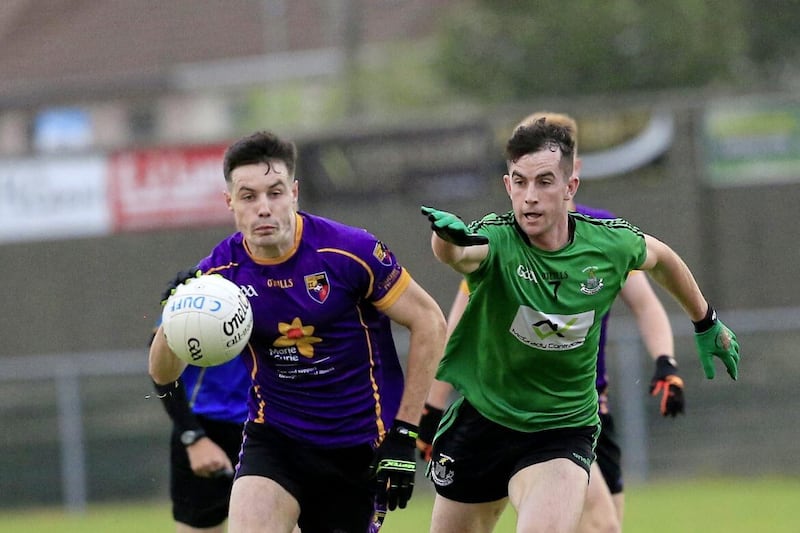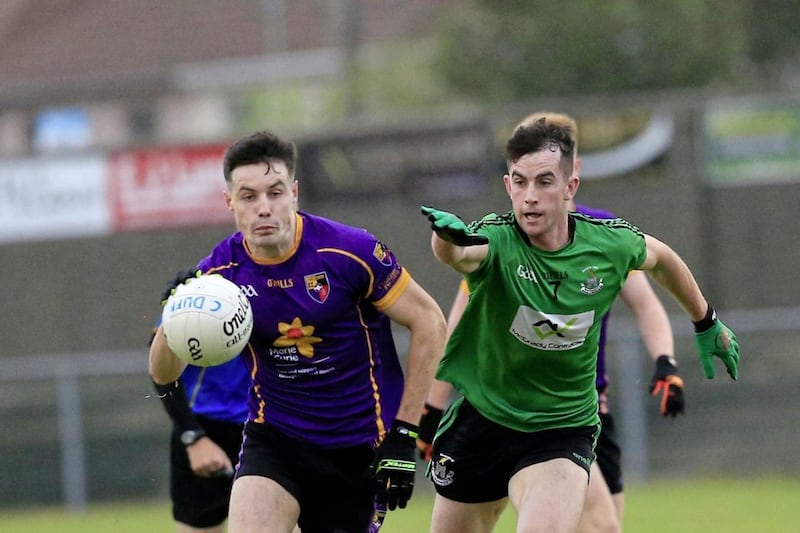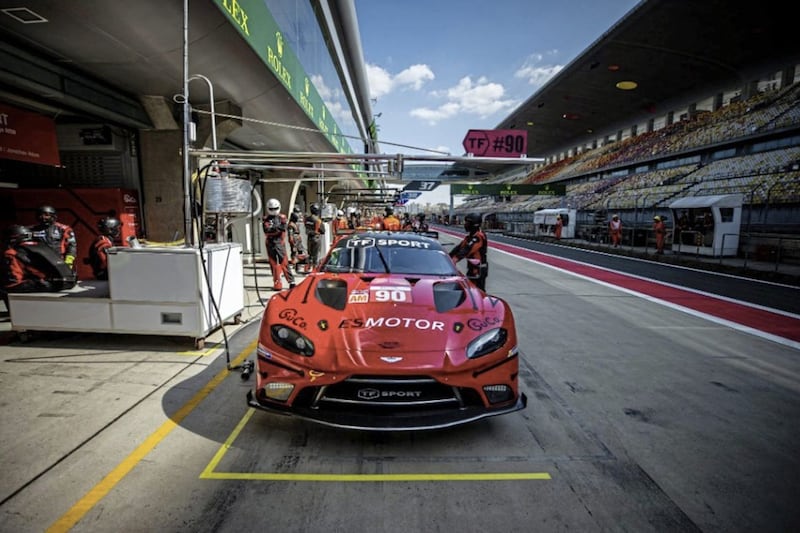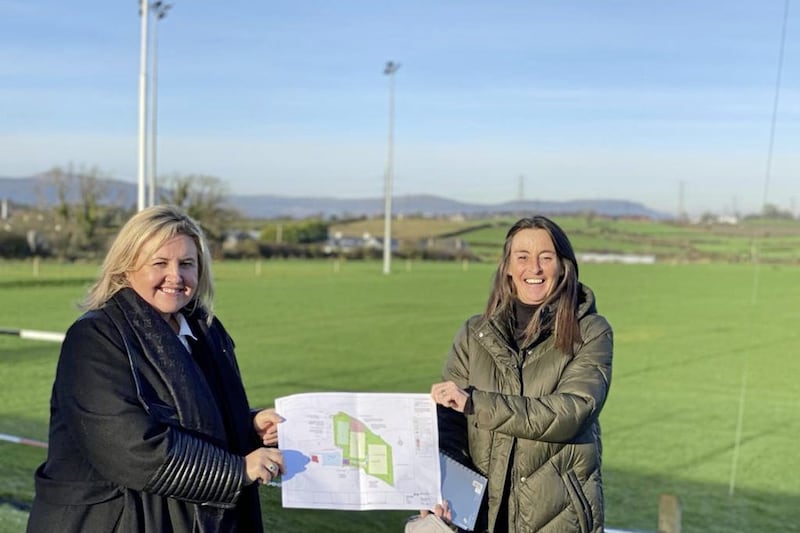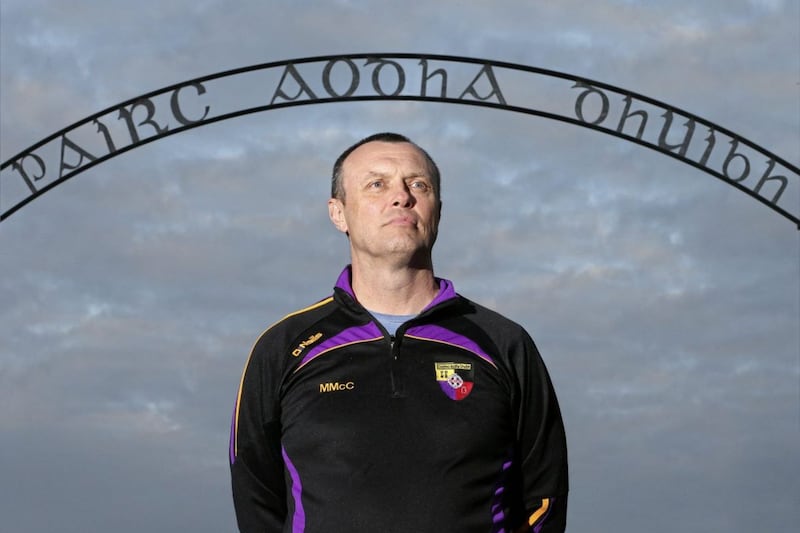MARK McCartan didn’t have long to drink in the moment. It was shortly before 5pm last Sunday when, after a marathon back and forth battle with Ballyholland, Carryduff finally nudged their noses across the line.
On a sunny September day at Pairc Esler, the players from both sides were completely sapped of energy when the long whistle sounded at the end of extra-time. The limited band of supporters, McCartan among them, were wilting in the heat too.
Yet there was no time for misty-eyed reminiscences about Carryduff’s long road to a first senior county final. Not then anyway.
Within minutes McCartan had hopped into his car and was on the way back up the road, destination Teconnaught GAC where the club’s ladies were taking on rivals Bredagh in another Down decider.
“I was down off cloud nine by eight o’clock because our ladies lost [Bredagh won 3-17 to 1-5 to claim their third title in-a-row]. It fairly put a dampener on things.
“My son works in the Errigle Inn, I went down to pick him up later that night and he was standing outside the Parador with a pint in his hand. Of course all the Bredagh ones were there too - they were delighted we won but they were mostly talking about how their ladies had beaten ours.”
It is only as the week has worn on that the significance of their young team’s achievement has begun to sink in.
A first senior county final for a club who were comprehensively dismissed by bona fide championship contenders Clonduff just a month ago.
After that night you’d have got some odds on Carryduff still standing by September 20, but here they are after being handed a bye against RGU Downpatrick before blitzing Bryansford and then beating Ballyholland in the last four.
On Wednesday night purple and gold flags popped up along the Saintfield Road from Carryduff roundabout down to the club’s Knockbracken Drive home, where the team was being put through its paces ahead of Sunday’s David v Goliath showdown with Down and Ulster kingpins Kilcoo.
The children of St Joseph’s and St Ita’s primary schools will show their support by donning club colours today. Bit by bit, the buzz is growing - the club itself having evolved at a similarly gradual pace since its formation in 1971.
Then a group of parents, concerned at the lack of playing facilities in this rapidly-growing southern suburb of Belfast, came together to form a schoolboys’ football team. Driven on by men like Harry McEvoy, Paddy McEvoy and Martin McAteer, Carryduff had a senior team competing in the East Down League within a couple of years.
By that time, they had a legend in their midst too. Dan McCartan, a cornerstone of Down’s 1960, ’61 and ’68 All-Ireland wins, had opened a dentistry practice in Andersonstown and, after years spent with Glenn and then Tullylish, became involved with the fledgling club on the outskirts of the city.
As the Troubles began to take hold, though, finding a place to call home, or a place to play at all, proved far from straightforward.
“There was a pitch up the Knockbracken Road they used to play at initially but there was glass put on the field, the posts were bent,” says Dan’s son Mark, a stalwart of the club both on and off the field.
“We used to train on a soccer pitch in Purdysburn but there was only one light, so that was no good after the summer. We were in Killyleagh for a while when the GAA club was still going there… we were known as 'the nomads' because we didn’t have a pitch.
“If we had a home match against Darragh Cross we used to actually drive through Darragh Cross to play them in Killyleagh, which is about 15 miles away from Carryduff.
“Our next semi-permanent home would’ve been The Dub, we played at Lamh Dhearg’s pitch, Bredagh let us use theirs… I remember playing all over for Carryduff. We moved to Cherryvale for a lock of years and then finally got on our own pitch in 2001.”

Yet, even without a place to call their own, Carryduff would eventually emerge as one of the strongest junior teams in the county. In 1978 15-year old Greg Blaney, one of the architects of Down’s 1991 and ’94 All-Ireland successes, made his senior debut in purple and gold.
“Greg’s from Kircubbin, his dad was a pharmacist in Andersonstown - his dad and my dad were best buddies, he had no football club so he came and played with us,” added McCartan.
“In the middle of his career Ballycran had a football club for four of five years so he played with them, but when that stopped he came back.”
Dan McCartan wasn’t the only Sixties great playing for Carryduff when Blaney arrived either, with Fermanagh star PT Treacy – winner of four Railway Cup medals from 1963 to 1967 – also enlisted.
Alhough they made it to Division Two in 1981, it wasn’t until the mid-1980s that a painstaking juvenile coaching policy began to bear fruit, resulting in the emergence of homegrown talent like John Kelly and a young Mark McCartan by the end of the decade.
Kelly was a key part of Pete McGrath’s Down defence as the Mournemen swept to All-Ireland glory in 1991, with McCartan coming off the bench in the Ulster Championship victories over Armagh and Derry.
Back at the club, though, it wasn’t only about the young lads.
Almost 30 years on from being part of the first Ulster side to bring Sam Maguire back across the border, Dan McCartan was still stripping out when his son joined the senior fold.
“Dad was around 50 then but he still would’ve done goals for us. Even when [two time All-Ireland winning goalkeeper] Neil Collins transferred to Carryduff, Neil would’ve played outfield because dad was in nets.
“He played on into the 1990s as well, full-forward with the thirds. I think he was 59 when he played his last game. It was a great honour to be able to get to play with him, and then also to get to play alongside my own son Dan later on.”
Like his father, longevity was clearly in the McCartan genes as Mark only stopped playing with the thirds three years ago. Now 53, he is current chairman of male football at a club with no cap on its ambitions.
Yet it is only in recent times that the stars have began to align. For years, Carryduff were spoken of as the coming force in the county but, by McCartan’s own admission, tales of emerging talent among their huge membership was often without any real foundation.
“That was the talk, we heard it alright,” he laughs, “unfortunately it just wasn’t true.”

There are over 1,100 on the books nowadays, with the main issue providing the facilities to accommodate an ever-expanding club community.
After the opening of the first pitch 19 years ago, the clubhouse was built in 2004, before a training area and second pitch opened in 2013. A third pitch was included in Carryduff’s 2019-2022 development plan, but financing the project is proving difficult.
“Because of where we are, in what is seen as a middle class area, we don’t get the grants of some other clubs. We have land there, we just don’t have funds for another pitch.
“There’s too many teams and not enough places to train. There was a night this year where we had three home matches - two U12 games went across one pitch, then there was a minor match on the other, and that’s the night your senior footballers are supposed to train.”
All those frustrations can be put on the backburner for now, however, as the club gears up for the biggest day in its short history - and it is with some justification that they are now viewed as ones to watch.
Last year, Carryduff completed a three in-a-row of U21 county titles. Of the 15 players who lined out against Ballyholland on Sunday, eight started last November’s U21 final against Mayobridge.
Half-forward Owen McCabe and brothers Daniel and James Guinness are all established members of Paddy Tally’s Down panel, goalkeeper Mark Hynes has worn county colours in the past and did his chances of doing so again no harm with a brilliant display against Ballyholland, while the performances of centre-back John McGeough and forward Ronan Beatty can’t have gone unnoticed by the Galbally man.
The foundations are there for a strong future and, regardless of what happens against Kilcoo this weekend, the trajectory is only travelling in one direction.
“We’re happy with where we are, and we’ve made strides because we’re producing players of inter-county minor standard,” says McCartan.
“Another thing that has helped us is the rise in tuition fees in England because a lot of boys now simply can’t afford to go over the water so they’re going to university here, which has been a big thing in terms of building that continuity.
“But you have to be realistic. Carryduff won a junior championship in 1986, an U14 championship in 2009 and then the U21 championships in 2017, ’18 and ’19 – that’s it.
“And then you look at Kilcoo. Down champions seven out of the last eight years, Ulster champions, All-Ireland finalists. We’ve never even played them in senior championship so you’re going into the unknown, but this group of boys will embrace the challenge.
“They won’t go into the game with any fear because what’s the point? Nobody expected us to be here, being honest we probably didn’t expect to be here ourselves. It’s a free hit for us, we’ve come in the back door, and we’ve got better since we lost to Clonduff.
“We’ll give it a go and that’s all we can do. If we win, we win, if we don’t it’s a great learning experience and one you go back and build on for the future.”




